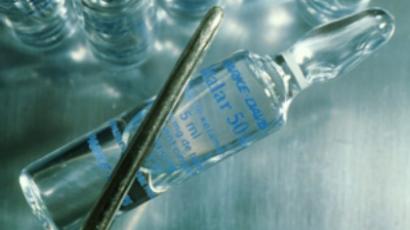Albanian journo on the frontline of war on drugs
A TV reporter from Albania has put himself on the frontline uncovering and filming illicit drug plantations, helping police battle the drugs gangs.
Artan Hoxha is Albania’s number one drug cop, though he doesn’t get his salary from the forces.
He makes his living working for a private TV channel in Tirana where he hosts his own show – “The Jungle”.
For years Artan has been on the trail of some of Albania’s most wanted drug lords. His weapon is his camera, and his lens captures the evidence that force the police to act.
“Because of the money the traffickers make, they get political weight. They’re able to pay off politicians who in turn pay off the security agents. My advantage is that because I’ve been investigating this story for so long I have the coordinates on where this stuff is grown. I wait until August, September and then go film the fields. The police then have no choice but to do something,” Hoxha says.
Illegal drug trafficking took off in Albania when communism collapsed in the early nineties.
Today, the country is Europe’s second largest producer of marijuana and an important transit route for heroin from Afghanistan to markets in the West like Greece, Italy and Turkey. More and more young Albanians are lighting up, which means profits for drug traffickers are reaching hundreds of millions of dollars each year.
“The police control about 95% of the country, but the problem is in these enclaves where the drugs are grown. They generate so much cash that the drug lords are able to buy arsenals of military guns and weapons and even have their own private armies. So when the special forces go in, there are always shootouts and innocent people get killed,” Hoxha says.
Two years ago special forces tried to enter a village close to the Albanian border with Greece, but they didn’t get far before the drug barons launched a revenge attack
Proof of their trade is everywhere, like in sacks of marijuana waiting to be picked up and taken to warehouses, like the one in the southern port of Vlora. From there Italian drug traffickers smuggle them across the border.
Most of the drugs are taken out of Albania in trucks where they are hidden among other goods. The trucks go through the border crossings because it’s too difficult for them to maneuver through these mountain passes.
They used to use speed boats, and many were stopped by Albanian police helicopters and Italian sea patrols with as much as 450 kilos of drugs onboard. That’s why since 2006 it’s been illegal for an Albanian to use a speedboat on the Adriatic Sea.
Hoxha’s critics accuse him of exaggerating the problem, which is why he now comes to the fields himself to walk through the plantations.
Nearly a quarter of a million marijuana plants were cut down after Hoxha’s footage was aired, and it’s successes like these that keep the journalist sniffing around.
Albania’s European Union bid this April should see the country’s police forces tighten their grip, but with their hands full with so many other problems, their efforts could also go up in smoke.
Observers blame neighbouring countries for not doing enough to help.
“They know very well where they are based in our territory, but they prefer, in order to show big success in their media, that this operation has to be done on their borders,” political analyst Mentor Nazarko clarifies.














